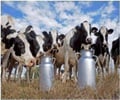Lactose intolerant individuals often avoid milk and dairy products, thereby depriving themselves of calcium, vitamin D, and other essential nutrients.
Lactose intolerant individuals often avoid milk and dairy products, thereby depriving themselves of calcium, vitamin D, and other essential nutrients.
However, eliminating these nutrient-rich foods may not only be unnecessary to manage the condition - it could impact diet and health, concludes a panel of experts assembled by the National Institutes of Health (NIH).The NIH Consensus Development Conference on Lactose Intolerance and Health was convened to examine the latest research on lactose intolerance, strategies to manage the condition and the health outcomes of diets that exclude dairy foods.
Lactose is the natural sugar in milk and some people lack sufficient amounts of an enzyme that is needed to comfortably digest lactose.
After a thorough review of the scientific evidence, the Consensus Development Conference panel completed a draft consensus statement that is intended to correct some of the common misperceptions about lactose intolerance, including the belief that dairy foods need to be excluded from the diet.
Without lowfat and fat free milk and milk products in the diet, it's hard to meet nutrient needs, and available research suggests people with lactose intolerance can tolerate at least 12 grams of lactose (the amount in about one cup of milk) with no or minor symptoms.
Also, gradually re-introducing dairy into the diet can help manage symptoms and help those diagnosed benefit from dairy's unique nutrient package, including calcium, vitamin D, protein, potassium and other nutrients that are critical for bone health and beyond.
Advertisement
Dr. Robert P. Heaney, a prominent researcher at Creighton University who presented findings to the panel on the health outcomes of dairy exclusion diets, said that lactose intolerance is a topic that is frequently misunderstood.
Advertisement
Source-ANI
RAS












